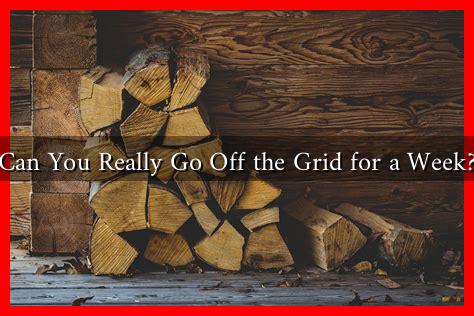-
Table of Contents
Can You Really Go Off the Grid for a Week?
In an age dominated by technology and constant connectivity, the idea of going “off the grid” has gained significant traction. Many people fantasize about escaping the hustle and bustle of modern life, seeking solace in nature, and disconnecting from their digital devices. But can you really go off the grid for a week? This article explores the feasibility, preparation, and potential challenges of living off the grid for a short period.
Understanding Off-Grid Living
Off-grid living refers to a lifestyle that seeks to minimize reliance on public utilities and services. This can include generating your own electricity, sourcing your own water, and growing your own food. While some people choose to live off the grid permanently, others may consider it for a short retreat. The concept can be appealing for various reasons:
- Desire for self-sufficiency
- Environmental concerns
- Stress relief and mental health benefits
- Adventure and exploration
Preparation: What You Need to Consider
Before embarking on an off-grid adventure, thorough preparation is essential. Here are some key factors to consider:
- Location: Choose a suitable location that allows for off-grid living. National parks, remote cabins, or private land can be ideal.
- Supplies: Stock up on essential supplies, including food, water, and first-aid kits. Non-perishable food items like canned goods, dried fruits, and nuts are great options.
- Equipment: Invest in necessary equipment such as portable solar panels, water filtration systems, and camping gear.
- Communication: Consider how you will communicate in case of emergencies. A satellite phone or a two-way radio can be useful.
- Skills: Brush up on survival skills, such as fire-making, navigation, and basic first aid.
Challenges of Going Off the Grid
While the idea of disconnecting from technology and immersing oneself in nature is appealing, several challenges can arise:
- Access to Resources: Finding clean water and food can be difficult. It’s crucial to plan ahead and know your surroundings.
- Weather Conditions: Unpredictable weather can impact your experience. Be prepared for rain, cold, or extreme heat.
- Isolation: Being away from civilization can lead to feelings of loneliness or anxiety, especially for those used to constant social interaction.
- Safety Concerns: Wildlife encounters or injuries can pose risks. Always have a plan for emergencies.
Case Studies: Real-Life Experiences
Many individuals and families have successfully gone off the grid for a week or more. For instance, a family from Oregon documented their week-long off-grid experience in a remote cabin. They reported challenges such as limited access to fresh food and the need to adapt to a new routine without modern conveniences. However, they also highlighted the bonding experience and the joy of reconnecting with nature.
Another example is a group of friends who organized a week-long camping trip in the wilderness. They relied on solar-powered devices for minimal electricity and practiced foraging for food. Their experience taught them valuable survival skills and deepened their appreciation for nature.
Statistics on Off-Grid Living
According to a survey conducted by the National Renewable Energy Laboratory, approximately 20% of Americans have considered off-grid living at some point. Additionally, a report by the U.S. Department of Energy indicates that the off-grid solar market has grown by over 50% in the last five years, reflecting a growing interest in self-sufficiency.
Conclusion: Is It Worth It?
Going off the grid for a week can be a rewarding experience, offering a break from the digital world and an opportunity to reconnect with nature. However, it requires careful planning and preparation to ensure safety and enjoyment. By understanding the challenges and equipping yourself with the necessary skills and supplies, you can successfully navigate a week off the grid.
Ultimately, whether you choose to go off the grid for a week or simply take a day to unplug, the key takeaway is the importance of balance in our increasingly connected lives. For more information on off-grid living and resources, you can visit Off Grid World.

